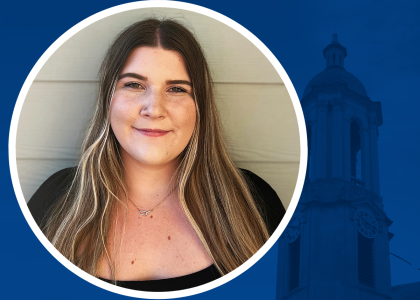Program Goals and Effectiveness
As a flexible, multidisciplinary program that prepares students for different career paths, HDFS does not have an accrediting body; however, we conduct annual assessments of our program goals and objectives to monitor our program effectiveness and identify ways to improve our student experience. We have organized diverse program goals and learning objectives that we support all students in achieving.
Program Goals
As an HDFS student you will learn about concepts and research that will help you understand human development across the lifespan. You will learn about:
- Biological, psychological, and social development of people and families.
- Individuals and families in your own and other cultures.
- How the family, the workplace, schools, the community, and the larger culture affect and are affected by the individual.
- Social issues, including child, spouse, and older adult abuse, substance use, and divorce.
- Helping individuals, families, or groups through prevention programs and other intervention techniques.
- How human service agencies and professionals deal with these problems.
- Alternative approaches to promoting optimal development.
- Leadership and managerial skills necessary for success in administration and evaluation of human service programs.
- Moral, ethical, and legal issues you will face as a professional.
Learning Objectives
On completion of the undergraduate degree in Human Development and Family Studies, students will:
-
Demonstrate an understanding of the complexity of individual and family development across the life span in diverse contexts and changing environments.
-
Demonstrate an ability to evaluate and apply research and theory to practice and policy.
-
Analyze processes, policies, and contextual factors that affect the delivery of human services to individuals and families.
-
Demonstrate professional, ethical, and culturally sensitive standards of conduct.
-
Demonstrate knowledge and competence in helping, leadership, and administrative skills for human services.
Program Effectiveness
The department conducts annual assessments of our courses, teaching and internship program to determine whether our students are reaching these learning objectives and to identify ways we can improve our program. We draw upon three sources of information to complete these assessments.
- Learning in Courses
-
In addition to evaluations of each instructor’s performance in every course, we track the performance of our students on tests and assignments across multiple instructors and semesters in our core required courses. For example, in our introductory course on Interventions (311), 92 percent of students successfully completed a written assignment in which they used concepts from prevention science to describe an intervention program.
- Supervisor Surveys
-
More than 90 percent of HDFS majors complete a one-semester, full-time internship, most often in their final semester. To gain an outside perspective on our students’ preparation for professional roles, we survey our students’ internship supervisors. In a recent supervisor survey focused on professional and ethical standards, 94-98 percent of supervisors rated our students positively (4 or 5 on a 5-point scale) on (a) ability to act in an ethically informed manner, (b) cultural sensitivity and (c) professional standards.
- Senior Exit Surveys
-
Each year we survey graduating seniors at the end of their last semester. In a recent survey, 90 percent of seniors reported that their education in HDFS prepared them “well” or “very well” to work in a human services field; 92 percent reported that their HDFS education helped them understand policies relevant to human services; and 98 percent reported that their HDFS education helped them understand how individual and family differences affect the delivery of human services. In another senior exit survey, 97 percent of seniors reported they were well or very well prepared to work with children, youth, adults, and families in a professional and ethical way.



